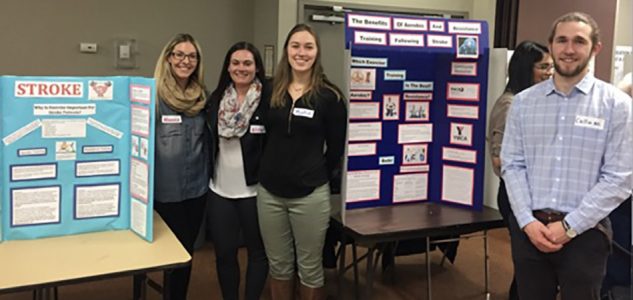Kinesiology course promotes health and wellness to older adults in Hamilton

From left to right: Alanna Jakovljevic, Alison Zorit, Katie Svoboda, Callum MacLeay
BY Sarah Janes
March 28, 2017
How can exercise slow the progression of age-related diseases?
Janet Pritchard, assistant professor, teaches a fourth year Kinesiology course that takes students out of the classroom and downtown to Hamilton’s First Place Seniors Residence.
Students complete a research project about how exercise can be used to manage or help with the progression of certain age-related diseases such as osteoporosis, osteoarthritis, dementia, heart disease, and more. The evidence-based information is then presented by the students to tenants at the seniors residence.
“The project involved seeking out resources in order to guide older adults on how to exercise safely, and how to reap the benefits of exercise if they have chronic age-related diseases,” said Pritchard.
“This is a new initiative for the Kinesiology department that gets students interacting with a local organization and community members.”
Fourth year Kinesiology students Emily Smolej and Madi Jenkins found that almost half a million Canadian adults have experienced a heart attack in their life. Participating in an aerobic exercise-based cardiac rehabilitation program adults can decrease their risk of a repeat heart attack by more than 30%.
Students Katie Svoboda and Callum MacLeay found that both aerobic and resistance training combined has a significant positive impact on the lives of stroke survivors.
Harshit Ratan and Anne Mathew’s project focused on treadmill training in mild to moderately affected Partinson’s patients. They found that incremental treadmill training as short as eight weeks with or without body weight support was shown to double the walking distance on treadmill, reduce the fear of falling by 15% and increase tolerated maximum speed by 40%.
“It’s important to work with McMaster programs that have a focus on community engagement,” said Louanne McClemont, recreation coordinator for First Place Ontario.
“This type of event allows us to break down barriers to accessing information and creates informed seniors about myths associated with exercise.”
After the event three tenants began attending a Falls Prevention Exercise Program at First Place and two other tenants got involved in their residence wellness program.

